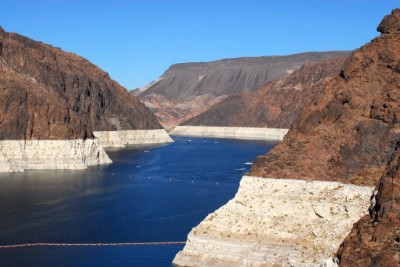
Lake Mead, with the “bathtub rings” showing the previous water level. Image source: earthmagazine.org
The mega-drought in the west extends far beyond California, as new government data is predicting massive water shortages in the Colorado River Basin that could impact at least seven states.
The shortages could threaten the water supplies for 40 million people in those states, limit water supplies to major cities like Phoenix and Las Vegas, and lead to crop and food shortages.
There is a 20 percent possibility of water shortages in Arizona and Nevada next year and a 50 percent possibility of water shortages by 2017, Deputy Interior Secretary Mike Connor told a Congressional committee. Connor based his assessment on a low Colorado River and on the depletion of two of America’s largest reservoirs, Lake Mead and Lake Powel, each of which are less than half full. The river feeds both reservoirs.
Chuck Cullom, a manager at the Central Arizona Project, believes the water shortages will start next year. The Project runs the canals that supply water from the Colorado River to Phoenix and Tucson and many farms.
Ultra-Efficient Water Filter Fits In Your Pocket!
“We’re trying to stave off a crisis,” Cullom said.
The Colorado River Is Going Dry
The problem in Arizona is that not enough water is coming down the Colorado River from the Rocky Mountains because of a drought that has been going on for 14 years. This year’s spring runoff will not help matters because the runoff from the snowmelt likely will be 71 percent of average, according to the Discover Magazine blog.
The effects are already being felt at Lake Mead and Lake Powell. Lake Mead, the reservoir behind the Hoover Dam, is at 41 percent of its capacity, its lowest level since the dam was completed in 1938. Lake Powell is at 45 percent of its capacity.
Levels in Lake Mead could fall so low by 2020 that officials will have to cut back water supplies to Phoenix and Tucson, The New York Times reported. Phoenix gets about half of its water from Lake Mead and Tucson gets all of its water from Lake Mead.
“The possibility of cutbacks of water deliveries to municipalities is higher than we’ve ever thought it was going to be,” Sharon Megdal, a board member at the Central Arizona Project, told The Times last year.
Farmers’ irrigation water supplies are already being cut in an effort to keep reservoirs on the Colorado River from going dry, The Republic reported. Arizona farmer Dan Thelander told The Republic that he will have to cut crop production because of the cuts to his water supply.
Story continues below video
One immediate result of the water crisis in Arizona and Nevada could be food shortages and higher prices for fruits and vegetables if farmers are forced cut back. Arizona is America’s number two producer of several crops, including lettuce, cantaloupe, honeydew melons, broccoli, cauliflower and lemons.
Las Vegas Tries To Divert Ranchers’ Water To Casinos
The water level in Lake Mead is so low that the Southern Nevada Water Authority, which supplies Las Vegas with water, is drilling a new water tunnel to literally drain water out of the bottom of Lake Mead. The Authority is also planning to build 263 miles of pipelines to drain groundwater from four valleys in Central Nevada to Las Vegas to provide an alternative source of water.
Sin City needs the water to keep its casino industry going, Bloomberg Business reported. The Authority and developers are trying to strip the Cleveland Ranch in Spring Valley, Nevada, which is owned by the Church of Jesus Christ of Latter-say Saints, and other landowners of water rights in order to get the water. The cattle on the land are processed to feed the world’s poor. Around 90 percent of Las Vegas’ water comes from Lake Mead.
“This is kind of a poster child case for pro-development interests in urban centers trying to take water away from rural areas through a large infrastructure project by arguing, based on bad science, that vast amounts of water are available for extraction and export,” water attorney Simeon Herskovits, who is representing ranchers and others opposed to the project, told Bloomberg.
If it is built, the new Las Vegas pipeline could end ranching and farming in an area of Nevada as large as New England, Herskovits said. The groundwater Vegas wants to take is many ranchers’ only source of water. If the drought continues, many more farmers and ranchers could find their water supplies diverted to the big city.
Powerful special interests, including the AFL-CIO, casino owners and the Howard Hughes Corporation — which owns large amounts of undeveloped land around Las Vegas — are pushing the water grab, Bloomberg reported. The courts have blocked the grab, but opponents fear economic interests will lobby the Nevada State Legislature to change the law so they can take ranchers’ water.
“Money talks,” water attorney Jeffrey Dintzer said. “Nevada gets a huge amount of its revenue from gaming.”
Do you believe America is ready for the impact of a mega-drought? Share your thoughts in the section below:
Want To Learn More About The Mega-Drought And How To Survive It? Click Here.
 Off The Grid News Better Ideas For Off The Grid Living
Off The Grid News Better Ideas For Off The Grid Living



